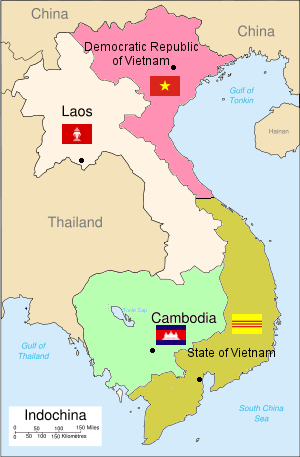1954 Geneva Conference
The Geneva Conference, intended to settle outstanding issues resulting from the Korean War and the First Indochina War, was a conference involving several nations that took place in Geneva, Switzerland, from April 26 to July 20, 1954.[1][2] The part of the conference on the Korean question ended without adopting any declarations or proposals, so is generally considered less relevant. The Geneva Accords that dealt with the dismantling of French Indochina proved to have long-lasting repercussions, however. The crumbling of the French Empire in Southeast Asia led to the formation of the states of the Democratic Republic of Vietnam (North Vietnam), the State of Vietnam (the future Republic of Vietnam, South Vietnam), the Kingdom of Cambodia and the Kingdom of Laos.
Diplomats from South Korea, North Korea, the People's Republic of China (PRC), the Union of Soviet Socialist Republics (USSR) and the United States of America (US) dealt with the Korean side of the Conference. For the Indochina side, the Accords were between France, the Viet Minh, the USSR, the PRC, the US, the United Kingdom and the future states being made from French Indochina.[3] The agreement temporarily separated Vietnam into two zones, a northern zone to be governed by the Viet Minh and a southern zone to be governed by the State of Vietnam, then headed by former emperor Bảo Đại. A Conference Final Declaration, issued by the British chairman of the conference, provided that a general election be held by July 1956 to create a unified Vietnamese state. Despite helping create some of the agreements, they were not directly signed onto nor accepted by delegates of both the State of Vietnam and the United States. The State of Vietnam, under Ngo Dinh Diem, subsequently refused to allow elections, leading to the Vietnam War. Three separate ceasefire accords, covering Cambodia, Laos, and Vietnam, were signed at the conference.
On February 18, 1954, at the Berlin Conference, participants agreed that "the problem of restoring peace in Indochina will also be discussed at the Conference [on the Korean question] to which representatives of the United States, France, the United Kingdom, the Union of Soviet Socialist Republics and the Chinese People's Republic and other interested states will be invited."[4]: 436
The conference was held at the Palace of Nations in Geneva, commencing on April 26, 1954. The first agenda item was the Korean question to be followed by Indochina.[4]: 549
The armistice signed at end of the Korean War required a political conference within three months—a timeline which was not met—"to settle through negotiation the questions of the withdrawal of all foreign forces from Korea, the peaceful settlement of the Korean question, etc."[5]
As decolonization took place in Asia, France had to relinquish its power over Indochina (Laos, Cambodia and Vietnam). While Laos and Cambodia were both given independence, France chose to stay in Vietnam. This ended with a war between French troops and the Vietnamese nationalists led by Ho Chi Minh. The latter's army, the Viet Minh, fought a guerrilla war, while the French employed traditional Western technology. The deciding factor was the Battle of Dien Bien Phu in 1954, where the French were decisively defeated. This resulted in French withdrawals, and the Geneva conference.


